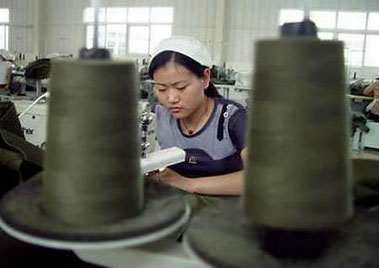|
China to raise export tariffs
(Agencies/chinadaily.com.cn/Xinhu)
Updated: 2005-05-20 13:48
China will raise export tariffs on exports of 74 classes of clothing and
textile products from June 1, the Ministry of Finance said on Friday, a gesture
that might help to appease Western trading partners.

A Chinese worker
sews a dress in a garment manufacturing company at Huaibei, east China's
Anhui province in this picture taken on May 19, 2005. China will raise
export tariffs on exports of 74 classes of clothing and textile products
from June 1, the Ministry of Finance said on Friday, a gesture that might
help to appease Western trading partners.
[newsphoto] | Tariffs on most of those products
would rise to 1 yuan ($0.121) per unit from 0.2 yuan, with the largest tariff
per item at 4 yuan, the ministry said in a statement posted on its official Web
site (www.mof.gov.cn).
Products listed included trousers, T-shirts and underwear.
"The decision was approved by the State Council," the ministry said in its
statement.
Under the approved adjustment, tariffs on three categories of clothing,
including knitted women's underwears and cotton men's underwear, would be
lowered from the current 0.20 yuan to 0.05 yuan per unit.
Also, tariffs on two categories of clothes accessories, now at 0.5 yuan per
unit, could be abolished.
For other clothing items not included in adjustments, the export tariffs
approved on January 1, 2005 will continue to apply, the statement said.
China had imposed tariffs of 0.2 to 0.3 yuan per item on 148 categories of
exports from January 1, 2005 -- just as a decades-long quota regime
limiting its textile exports came to an end.
The China Textile Industry
Council said Friday Chinese textile companies would have to "make sacrifice" as
a result of the export tariff hike.
Sun Huaibin, spokesman for the Council, said that the Council understood the
decision of the government as "it is for the purpose of helping establish a new
world textile trade order and ease the trade friction that the government has
made the concession."
The American Chamber of Commerce in China welcomed China drastic hike of the
export tariffs, calling it a "constructive approach" toward resolving trade
differences.
However, Sun noted, the tariff hike would surely result in an increase of
cost and decrease of profits for domestic companies. Some companies might
sustain losses and textile workers might lose their jobs.
"This is what we don't want to see," said Sun.
Zhang Peisen, head of a policy research group of the State Administration of
Taxation, said the move, though painful for Chinese manufacturers and workers,
could also help the textile sector readjust their export strategies and
introduce more advanced technology to increase the added value of their
products.
But Zhang stressed that China's decision on the tariff hike "doesn't mean
that the US and EU restrictions are justified."
"I still doubt the figures released by the United States on Chinese textile
imports during the past four months, and I think their moves are simply not fair
because they just go against the principle of free competition," he said.
|